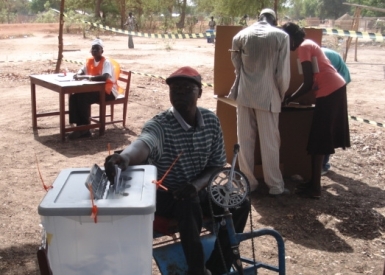Disabled persons abused in S. Sudan conflict, says rights group
May 31, 2017 (JUBA) – South Sudanese with disabilities are the vulnerable in the conflict and “are at greater risk of starvation or abuse,” Human Right Watch said in a report released on Wednesday.
 The report covered interviews conducted in, Juba, Malakal and Panyijar in South Sudan’s Upper Nile region where fighting between government and the SPLM in Opposition (IO) rebels have been fierce.
The report covered interviews conducted in, Juba, Malakal and Panyijar in South Sudan’s Upper Nile region where fighting between government and the SPLM in Opposition (IO) rebels have been fierce.
Shantha Rau Barriga, the disability rights director at the Human Right Watch said “people with disabilities and old people” are at risk of abuse in conflict areas.
“This problem is especially acute in South Sudan, where decades of civil war has increased the number of people with disabilities, and where armed forces on both sides target civilians with impunity,” Shantha said in the report.
The advocacy body said it interviewed more than 45 people with disabilities and older people sheltering at the protection of civilians sites at UN Mission in South Sudan (UNMISS) bases in Upper Nile region.
“Throughout the conflict, Human Rights Watch has documented numerous cases of people with disabilities and older people being shot, hacked to death, or burned alive in their houses by the belligerents,” the report said.
Armed conflict broke out in South Sudan in mid-December 2013, leading to death of thousands of people and displacement of more than two millions from their homes.
Several human rights reports documented abuses including rape, looting, torture and in-discrimination killings by both sides. The latest documentation centered on disabled people and revealed horrifying testimonies from survivors and relatives of the abused.
“The first time the government soldiers and militias came to my village in 2015, the old men and women who could not run were killed,” an older woman displaced with her family from Mayendit to Panyijar county in the former Unity state, told HRW investigators.
“There was Gatpan Mut, for example, who was a little old, and Gatkui Jich, who couldn’t move, and many, many more whose names I can’t remember,” she claimed.
During attacks in 2016 on Protection of Civilians (PoC) sites for displaced people inside of UN bases in Malakal and Juba, people with disabilities and older people were also left behind and struggled to find spaces to hide from attackers, HWR said.
Three members of the same family were burnt to death in POC base in Malakal when it came under attack in February 2016.
“When the fighting broke out, we fled to the UN compound and we left my mother and brother-in-law behind because they couldn’t walk and we couldn’t carry them,” a 45-year-old woman said.
“The son of my brother-in-law, who had a mental health condition, would not leave his father behind so they all burned together in the fire,” she added.
HRW said donors and humanitarian organizations should double their efforts to help the disabled persons.
“The struggle for survival by people with disabilities and older people in the South Sudan conflict underscores just how devastating the abuses against civilians have been,” Shantha said.
(ST)
